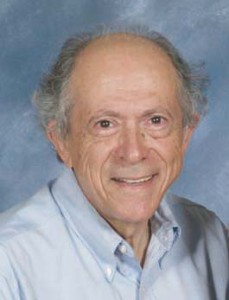Tamar Karkazian
Staff Writer

As Armenians we often find ourselves asking what we can do to preserve the Armenian spirit. One way would be to do what Dr. Abraham Terian has done throughout his life. As an expert on ancient translation, he has done his fair share of bringing the old back to life. Not only has he had experience in field-work, but he has also passed on his vast knowledge to many students, as a professor for over 30 years.
This spring he is sharing his knowledge with students at Fresno State as the eighth Henry S. Khanzadian Kazan Visiting Professor in Armenian Studies. The Kazan Visiting Professor teaches a single class on modern Armenian history or literature, with an emphasis on the Armenian Genocide. This semester, students in Dr. Terian’s Monday night class are learning about Armenian Literature and the Genocide. The course concentrates on the Armenian literature of the late nineteenth and twentieth centuries, with special focus on post-Genocide literature, both in Armenian and English.
Dr. Terian will also deliver three public lectures related to the Armenian Genocide, under the general title of “In the Darkness of the Genocide.” Buried in the dark and long shadows of the Armenian Genocide are certain issues that should not be forgotten as the struggle against denial and for recognition of the Genocide continues. The lectures address these issues that should bring added awareness and inspire activism as the centenary of the most tragic event in Armenian history draws closer. His first lecture was on February 17, with subsequent lectures on March 11, and April 29.
Dr. Terian was chosen as the Kazan Visiting Professor because of his extensive knowledge of Armenian literature. His favorite author is the 10th century poet, Naregatsi. “He is the greatest author of all time because of his deep thoughts, imagery, and use of language,” said Dr. Terian. Although Naregatsi is his favorite author, he feels that all Armenians should read the Life Of Mashtots by the fifth century author Koriun,because “It’s the starting point of everything Armenian.”
After “retiring” last year Dr. Terian and his wife Dr. Sara Kärkkäinen Terian moved to Fresno. Several factors led to their decision to move here. One was to be closer to their family, mainly their two daughters. The second was for the community, both for the Armenian community and the university-town feel. “It also reminds me of the Holy Land, ” remarked Terian.
Dr. Terian has taught a variety of classes: Archaeology, Jewish Philosophy, Greek, and Ancient History. However this is the first time he is teaching an Armenian Literature and Genocide class. He hopes that his students increase their awareness of the Genocide and become familiar with modern Armenian literature. Although most of his former classes were taught at a graduate level, he enjoys working with undergraduates. “They make me feel young,” he explains.
Born in Jaffa, Israel Dr. Terian came to the United States to study archeology. He grew up in the Armenian quarter in Jerusalem and was a tour guide in the Holy Land as a young adult. He credits that experience as the reason he can lecture without notes. Throughout his life he has learned five ancient languages and translated numerous works.
It wasn’t until Dr. Terian was working on his doctorate that he decided he wanted to study Classical Armenian and work on translations. “I was in a seminar when I learned that a fourth of Philo of Alexandria’s work survives in Armenian only,” revealed Dr. Terian. He soon realized that it was a wise investment. “Classical Armenian,” he explained “ties in with everything else.” For his doctoral studies he went to the University of Basel, in Switzerland, focusing on theology and the origins of Christianity.
Dr. Terian received his undergraduate degree in History and Biblical languages. He was a professor at Andrews University and later became Academic Dean and professor at St. Nersess Armenian Seminary in New York. He remained at St. Nersess from 1997 until his retirement in 2008.
Dr. Terian is the author of many articles and books, including Patriotism and Piety in the Armenian Christianity (Crestwood, NY, 2005) (The Armenian Gospel of the Infancy (Oxford, 2008) and Macarius of Jerusalem: Letter to the Armenians (Crestwood, NY, 2008).
 Hye Sharzhoom Armenian Action
Hye Sharzhoom Armenian Action